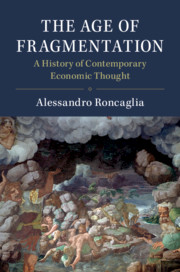Book contents
- The Age of Fragmentation
- The Age of Fragmentation
- Copyright page
- Contents
- Acknowledgements
- 1 Introduction: A Non-linear Discourse
- Part I The Background
- Part II The Giants of the Short Century
- Part III The Disgregation of the Mainstream
- 6 The New Microeconomics: General Equilibrium and Expected Utilities, Theory of Industrial Organization
- 7 The Macroeconomics of the Neoclassical Synthesis
- 8 The Myth of the Invisible Hand: Neo-liberal Streams
- 9 Applied Economics and Econometrics
- Part IV The Weakening of the Paradigm
- Part V Is a New Paradigm Possible?
- References
- Index
8 - The Myth of the Invisible Hand: Neo-liberal Streams
from Part III - The Disgregation of the Mainstream
Published online by Cambridge University Press: 25 November 2019
- The Age of Fragmentation
- The Age of Fragmentation
- Copyright page
- Contents
- Acknowledgements
- 1 Introduction: A Non-linear Discourse
- Part I The Background
- Part II The Giants of the Short Century
- Part III The Disgregation of the Mainstream
- 6 The New Microeconomics: General Equilibrium and Expected Utilities, Theory of Industrial Organization
- 7 The Macroeconomics of the Neoclassical Synthesis
- 8 The Myth of the Invisible Hand: Neo-liberal Streams
- 9 Applied Economics and Econometrics
- Part IV The Weakening of the Paradigm
- Part V Is a New Paradigm Possible?
- References
- Index
Summary
In the framework of a critical illustration of the contemporary history of economics, this chapter illustrates the various streams of neo-liberalism, from Ordoliberalism to Mises’s new Austrian school and Hicks’s Austrian capital theory, from Friedman and the Chicago school to rational expectations and supply-side economics, from the public choice school to political economics, from the Mount Pélerin Society to the Washington consensus and the idea of expansionary austerity. Step by step, the feeble theoretical and conceptual foundations of this set of theories are critically discussed.
Keywords
- Type
- Chapter
- Information
- The Age of FragmentationA History of Contemporary Economic Thought, pp. 177 - 217Publisher: Cambridge University PressPrint publication year: 2019

